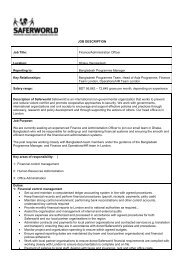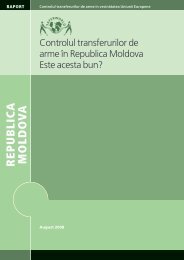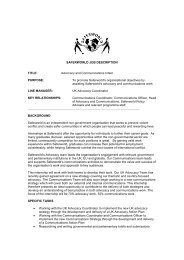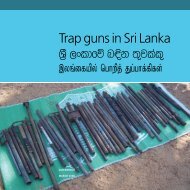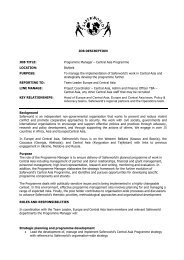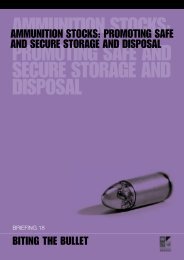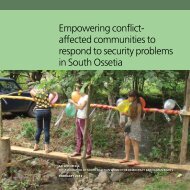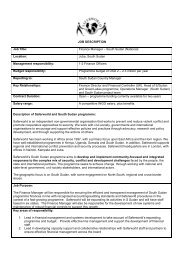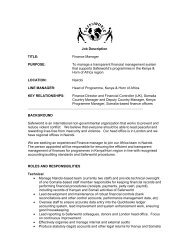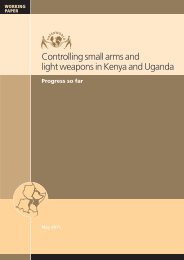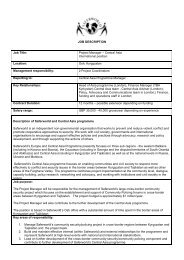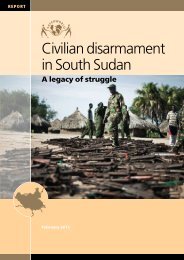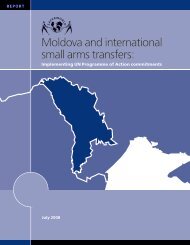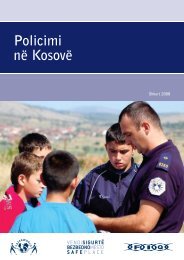Private Military Companies and the Proliferation of ... - Saferworld
Private Military Companies and the Proliferation of ... - Saferworld
Private Military Companies and the Proliferation of ... - Saferworld
Create successful ePaper yourself
Turn your PDF publications into a flip-book with our unique Google optimized e-Paper software.
<strong>Private</strong> <strong>Military</strong> <strong>Companies</strong> <strong>and</strong> <strong>the</strong> <strong>Proliferation</strong><br />
<strong>of</strong> Small Arms: Regulating <strong>the</strong> Actors<br />
by Sami Makki, Sarah Meek, Abdel-Fatau Musah, Michael Crowley <strong>and</strong> Damian Lilly<br />
BRITISH AMERICAN SECURITY INFORMATION COUNCIL<br />
The British American Security Information Council is an independent research organisation<br />
that analyses international security issues. BASIC works to promote awareness <strong>of</strong> security<br />
issues among <strong>the</strong> public, policy-makers <strong>and</strong> <strong>the</strong> media in order to foster informed debate<br />
on both sides <strong>of</strong> <strong>the</strong> Atlantic. BASIC has worked on small arms <strong>and</strong> light weapons issues<br />
since 1995. BASIC’s Project on Light Weapons has facilitated a network <strong>of</strong> analysts <strong>and</strong><br />
activists working on <strong>the</strong> issue around <strong>the</strong> world.<br />
Contents<br />
Executive Summary...................................................................................................................2<br />
<strong>Private</strong> <strong>Military</strong> <strong>and</strong> Security <strong>Companies</strong> <strong>and</strong> Small Arms <strong>Proliferation</strong>.....................................4<br />
Existing Efforts to Control Mercenaries <strong>and</strong> <strong>Private</strong> <strong>Military</strong> <strong>and</strong> Security <strong>Companies</strong>..............7<br />
Developing an International Regulatory Framework................................................................11<br />
Conclusion ...............................................................................................................................16<br />
Endnotes..................................................................................................................................17<br />
International Alert is an independent non-governmental organisation which analyses <strong>the</strong><br />
causes <strong>of</strong> conflicts within countries, enables mediation <strong>and</strong> dialogue to take place, sets<br />
st<strong>and</strong>ards <strong>of</strong> conduct that avoid violence, helps to develop <strong>the</strong> skills necessary to resolve<br />
conflict non-violently <strong>and</strong> advocates policy changes to promote sustainable peace.<br />
International A l e r t ’s Light Weapons <strong>and</strong> Peacebuilding Programme was established in 1994.<br />
It focuses on policy research, outreach <strong>and</strong> working with organisations in conflict regions to<br />
identify ways <strong>of</strong> controlling light weapons <strong>and</strong> small arms.<br />
<strong>Saferworld</strong> is an independent foreign affairs think tank working to identify, develop <strong>and</strong><br />
publicise more effective approaches to tackling <strong>and</strong> preventing armed conflicts. <strong>Saferworld</strong>’s<br />
Arms Programme, initiated in 1991, aims to foster greater international restraint over transfers<br />
<strong>of</strong> arms – from light weapons to major conventional weaponry – <strong>and</strong> dual-use goods. At <strong>the</strong><br />
same time, <strong>Saferworld</strong> aims to work with governments <strong>and</strong> non-government groups on <strong>the</strong><br />
ground in regions <strong>of</strong> conflict in order to better control flows <strong>of</strong>, <strong>and</strong> reduce dem<strong>and</strong> for, arms.
2<br />
3<br />
Executive Summary<br />
Executive Summary<br />
The 1990s witnessed a change in <strong>the</strong> way wars were fought as <strong>the</strong> amount <strong>of</strong> available<br />
weaponry increased <strong>and</strong> <strong>the</strong> types <strong>of</strong> actors engaged in warfare multiplied. The opening up<br />
<strong>of</strong> <strong>the</strong> international arms trade, in particular with new buyers <strong>and</strong> more channels <strong>of</strong> supply,<br />
has raised concerns about who purchases weapons <strong>and</strong> for what use. Afeature <strong>of</strong> this<br />
changing nature <strong>of</strong> conflict has been <strong>the</strong> continuing, if not growing, presence <strong>of</strong> mercenaries<br />
<strong>and</strong> <strong>the</strong> emergence <strong>of</strong> private companies contracted to provide military <strong>and</strong> security services.<br />
These range from logistical support <strong>and</strong> training to advice <strong>and</strong> procurement <strong>of</strong> arms <strong>and</strong><br />
on-<strong>the</strong>-ground intervention. This briefing highlights how <strong>the</strong> activities <strong>of</strong> mercenaries <strong>and</strong><br />
private military <strong>and</strong> security companies can contribute to small arms proliferation <strong>and</strong> misuse<br />
<strong>and</strong> examines steps <strong>the</strong> international community can take at <strong>the</strong> UN Small Arms Conference<br />
<strong>and</strong> elsewhere to effectively combat mercenarism <strong>and</strong> regulate <strong>the</strong> activities <strong>of</strong> private military<br />
<strong>and</strong> security companies.<br />
The role played by <strong>the</strong>se companies relates not only to provisions contained in <strong>the</strong> contracts<br />
<strong>the</strong>y sign with <strong>the</strong>ir clients to provide large amounts <strong>of</strong> weaponry, but also how <strong>the</strong> military <strong>and</strong><br />
security services <strong>and</strong> training that <strong>the</strong>y provide contributes to <strong>the</strong> dem<strong>and</strong> for weapons in <strong>the</strong><br />
regions where <strong>the</strong>y operate. There are a number <strong>of</strong> ways in which mercenaries <strong>and</strong> private<br />
military <strong>and</strong> security companies are involved in small arms proliferation. These include:<br />
●<br />
●<br />
●<br />
●<br />
Arms brokering <strong>and</strong> transportation activities<br />
Violations <strong>of</strong> UN arms embargoes<br />
Impact on human rights <strong>and</strong> humanitarian law<br />
Driving dem<strong>and</strong> for small arms<br />
Various measures already exist to ban <strong>the</strong> activities <strong>of</strong> mercenaries <strong>and</strong> regulate some <strong>of</strong> <strong>the</strong><br />
activities <strong>of</strong> private military <strong>and</strong> security companies ei<strong>the</strong>r through national legislation or<br />
international agreements. However, <strong>the</strong>re is concern <strong>the</strong>se efforts are nei<strong>the</strong>r comprehensive<br />
nor accepted widely enough to effectively control <strong>the</strong> activities <strong>of</strong> mercenaries <strong>and</strong> private<br />
military <strong>and</strong> security companies.<br />
To date, action to control mercenaries <strong>and</strong> private military <strong>and</strong> security companies has been<br />
ad hoc <strong>and</strong> sporadic. While most countries recognise <strong>the</strong> need to prohibit <strong>the</strong> activities <strong>of</strong><br />
mercenaries, few have developed relevant laws to support <strong>the</strong> international agreement that<br />
exists. The more complicated matter <strong>of</strong> private military <strong>and</strong> security companies has been left<br />
largely to self-regulation <strong>and</strong> corporate responsibility, with only a few countries (e.g. South<br />
Africa <strong>and</strong> <strong>the</strong> United States) developing <strong>and</strong> implementing specific laws on this issue. There<br />
is an urgent need for States to take steps to control not only <strong>the</strong> role <strong>of</strong> <strong>the</strong>se actors in <strong>the</strong><br />
arms trade but also <strong>the</strong>ir provision <strong>of</strong> military <strong>and</strong> security services. An interlocking framework<br />
<strong>of</strong> national, regional <strong>and</strong> international control mechanisms is required. Key priorities for States<br />
for <strong>the</strong> development <strong>of</strong> such a framework include:<br />
●<br />
●<br />
●<br />
●<br />
●<br />
●<br />
Ratification <strong>of</strong> relevant international <strong>and</strong> regional legal instruments.<br />
Introduction <strong>of</strong> controls over arms brokering <strong>and</strong> shipping agents that recognise <strong>the</strong> role<br />
played by private military <strong>and</strong> security companies;<br />
Development <strong>of</strong> national legislation to control <strong>the</strong> activities <strong>of</strong> private providers <strong>of</strong> military<br />
<strong>and</strong> security services;<br />
Better <strong>and</strong> more rigorous implementation <strong>of</strong> UN arms embargoes <strong>and</strong> sanctions, which<br />
include in <strong>the</strong>ir scope military <strong>and</strong> security services <strong>and</strong> technical assistance that may<br />
accompany arms transfers;<br />
Support for <strong>the</strong> continuation <strong>and</strong> broadening <strong>of</strong> <strong>the</strong> m<strong>and</strong>ate <strong>of</strong> <strong>the</strong> Special Rapporteur<br />
on mercenaries to include private military <strong>and</strong> security companies; <strong>and</strong><br />
Promotion <strong>of</strong> security sector reform programmes that lead to <strong>the</strong> development <strong>of</strong><br />
accountable security forces with proper civilian oversight <strong>and</strong> control so as to reduce <strong>the</strong><br />
need for <strong>the</strong> use <strong>of</strong> private military <strong>and</strong> security companies <strong>and</strong> support efforts to combat<br />
<strong>the</strong> illicit trade in small arms.
4<br />
5<br />
<strong>Private</strong> <strong>Military</strong> <strong>and</strong> Security <strong>Companies</strong><br />
<strong>and</strong> Small Arms <strong>Proliferation</strong><br />
<strong>Private</strong> <strong>Military</strong> <strong>and</strong> Security <strong>Companies</strong><br />
<strong>and</strong> Small Arms <strong>Proliferation</strong><br />
Introduction<br />
Definitions<br />
The 1990s witnessed a change in <strong>the</strong> way wars are fought as <strong>the</strong> amount <strong>of</strong> available<br />
weaponry increased <strong>and</strong> <strong>the</strong> types <strong>of</strong> actors engaged in warfare multiplied. The opening up<br />
<strong>of</strong> <strong>the</strong> international arms trade, in particular, with new buyers <strong>and</strong> more channels <strong>of</strong> supply<br />
has raised concerns about who purchases weapons <strong>and</strong> for what use. A feature <strong>of</strong> this<br />
changing nature <strong>of</strong> conflict has been <strong>the</strong> continuing, if not growing, presence <strong>of</strong> mercenaries<br />
<strong>and</strong> <strong>the</strong> emergence <strong>of</strong> private companies, contracted to provide military <strong>and</strong> security<br />
services, ranging from logistical support <strong>and</strong> training to advice, procurement <strong>of</strong> arms <strong>and</strong><br />
o n-<strong>the</strong>-ground intervention. There is a strong rationale that as <strong>the</strong> international community<br />
moves to consider how to regulate <strong>the</strong> activities <strong>of</strong> <strong>the</strong> actors involved in <strong>the</strong> international<br />
arms trade, such as arms brokers or arms transportation agents, <strong>the</strong> activities <strong>of</strong> private<br />
military <strong>and</strong> security companies should also become an area <strong>of</strong> attention <strong>and</strong> control.<br />
The focus <strong>of</strong> this briefing is on how <strong>the</strong> activities <strong>of</strong> mercenaries <strong>and</strong> private military <strong>and</strong><br />
security companies can contribute to small arms proliferation <strong>and</strong> misuse <strong>and</strong> what steps<br />
could be taken to address <strong>the</strong>ir role at <strong>the</strong> UN Small Arms Conference. The role played by<br />
private military <strong>and</strong> security companies relates not only to provisions contained in <strong>the</strong><br />
contracts <strong>the</strong>y sign with <strong>the</strong>ir clients to provide large amounts <strong>of</strong> weaponry, but also how <strong>the</strong><br />
military <strong>and</strong> security services <strong>and</strong> training that <strong>the</strong>y provide contributes to <strong>the</strong> dem<strong>and</strong> for<br />
weapons in <strong>the</strong> regions where <strong>the</strong>y operate. In this way private military <strong>and</strong> security<br />
companies contribute to <strong>the</strong> negative impact small arms proliferation can have on conflict<br />
transformation, human rights <strong>and</strong> humanitarian law, as well as post-conflict stability <strong>and</strong><br />
development. While generally not considered a central issue for <strong>the</strong> UN Small Arms<br />
Conference, a recently organised expert meeting on mercenaries by <strong>the</strong> Office <strong>of</strong> <strong>the</strong> UN High<br />
Commissioner for Human Rights called for addressing <strong>the</strong> issues linking mercenaries – in<br />
whatever form – <strong>and</strong> arms trafficking. 1 This briefing makes key recommendations for how <strong>the</strong><br />
issue could be tackled <strong>and</strong> loopholes closed in existing legislation. The regulation <strong>of</strong> military<br />
<strong>and</strong> security services that <strong>of</strong>ten accompany weapons sales is an emerging issue that should<br />
be addressed in <strong>the</strong> follow-up to <strong>the</strong> Conference <strong>and</strong> through o<strong>the</strong>r fora.<br />
Three terms are <strong>of</strong>ten used interchangeably in <strong>the</strong> debate on <strong>the</strong> privatisation <strong>of</strong> security:<br />
mercenaries, private military companies <strong>and</strong> private security companies. In simple terms,<br />
<strong>the</strong>y can be defined as:<br />
●<br />
●<br />
●<br />
mercenaries – individuals who fight for financial gain in foreign conflicts that are primarily<br />
used by non-State armed groups <strong>and</strong> more occasionally by governments;<br />
private military companies (PMCs) – corporate entities providing <strong>of</strong>fensive services<br />
designed to have a military impact in a given situation that are generally contracted by<br />
governments; <strong>and</strong><br />
private security companies (PSCs) – corporate entities providing defensive services to<br />
protect individuals <strong>and</strong> property, frequently used by multinational companies in <strong>the</strong> extractive<br />
sector, humanitarian agencies <strong>and</strong> individuals in situations <strong>of</strong> conflict or instability.<br />
Factors in <strong>the</strong><br />
privatisation<br />
<strong>of</strong> security<br />
The range <strong>of</strong> activities <strong>and</strong> services encompassed by <strong>the</strong>se three groups include:<br />
●<br />
●<br />
●<br />
●<br />
●<br />
●<br />
combat <strong>and</strong> operational support<br />
military advice <strong>and</strong> training<br />
arms procurement<br />
intelligence ga<strong>the</strong>ring<br />
security <strong>and</strong> crime prevention services<br />
logistical support<br />
There are differences between mercenaries, PMCs <strong>and</strong> PSCs, specifically in <strong>the</strong> services<br />
<strong>the</strong>y provide <strong>and</strong> <strong>the</strong> activities in which <strong>the</strong>y engage, as well as <strong>the</strong>ir target clients, which may<br />
be governments, multinational corporations or humanitarian agencies. Generally speaking,<br />
most PMCs have refrained from signing contracts with non-State armed actors (stating that<br />
<strong>the</strong>y will only work for internationally-recognised governments) although <strong>the</strong> fact that <strong>the</strong>re<br />
are few legal safeguards to prevent <strong>the</strong>m doing so is a cause for concern. <strong>Private</strong> security<br />
companies are usually used by multinational or national companies or by humanitarian<br />
agencies in situations <strong>of</strong> conflict or instability. Mercenaries on <strong>the</strong> o<strong>the</strong>r h<strong>and</strong> have been<br />
defined historically <strong>and</strong> in international law by <strong>the</strong> threat <strong>the</strong>y pose to <strong>the</strong> political integrity <strong>and</strong><br />
constitutional order <strong>of</strong> States by fighting alongside rebel groups. However, it must be<br />
recognised that <strong>the</strong>re are areas <strong>of</strong> overlap between <strong>the</strong>se groups <strong>of</strong> actors, in particular when<br />
PMCs hire mercenaries or where certain companies provide ‘dual services’ including both<br />
defensive security <strong>and</strong> <strong>of</strong>fensive military capabilities. This briefing focuses primarily on <strong>the</strong><br />
role <strong>of</strong> PMCs <strong>and</strong> PSCs in small arms proliferation, although <strong>the</strong> role <strong>of</strong> mercenaries, whose<br />
activities are less understood, is also considered.<br />
There are a number <strong>of</strong> factors that have contributed to <strong>the</strong> privatisation <strong>of</strong> security <strong>and</strong> <strong>the</strong><br />
outsourcing <strong>of</strong> military <strong>and</strong> security services. The end <strong>of</strong> <strong>the</strong> Cold War reduced <strong>the</strong> need for<br />
large st<strong>and</strong>ing armies <strong>and</strong> led to <strong>the</strong> demobilisation <strong>of</strong> tens <strong>of</strong> thous<strong>and</strong>s <strong>of</strong> highly pr<strong>of</strong>essional<br />
soldiers across Europe, North America <strong>and</strong> parts <strong>of</strong> Africa. Some <strong>of</strong> <strong>the</strong>se soldiers have<br />
established or have turned to employment with private military <strong>and</strong> security companies or<br />
have become freelance mercenaries. The close <strong>of</strong> <strong>the</strong> Cold War has also left a power vacuum<br />
in certain regions <strong>and</strong> countries affected by conflict which has in places been filled by private<br />
military <strong>and</strong> security companies that have been hired by warring factions. Ano<strong>the</strong>r factor has<br />
been <strong>the</strong> opening up <strong>of</strong> <strong>the</strong> international arms trade to an increasing number <strong>of</strong> buyers <strong>and</strong><br />
sellers, which has allowed a broader number <strong>of</strong> different actors with <strong>the</strong> necessary resources<br />
to access weaponry, not least <strong>of</strong> which are <strong>the</strong> small arms <strong>and</strong> light weapons <strong>of</strong>ten used in<br />
direct combat. In <strong>the</strong> past <strong>the</strong>se weapons moved through legal <strong>and</strong>/or illegal channels, but<br />
predominantly to government end-users. Although <strong>the</strong>re are concerns about <strong>the</strong> misuse <strong>of</strong><br />
arms by State forces, <strong>the</strong> proliferation <strong>of</strong> non-government end-users <strong>and</strong> lack <strong>of</strong> adequate<br />
governmental control has increased <strong>the</strong> use <strong>of</strong> arms to fuel conflicts <strong>and</strong> to facilitate human<br />
rights abuses <strong>and</strong> breaches <strong>of</strong> international humanitarian law. Finally, globalisation <strong>and</strong> <strong>the</strong><br />
integration <strong>of</strong> <strong>the</strong> global market driven by electronic financial transactions <strong>and</strong> highly mobile<br />
<strong>and</strong> accessible communication equipment has eased <strong>the</strong> means by which transnational<br />
organised criminal groups have been able to circumvent controls <strong>and</strong> exploit States with weak<br />
regulation or porous borders to conduct criminal activity, including <strong>the</strong> smuggling <strong>of</strong> weapons.
6<br />
7<br />
<strong>Private</strong> <strong>Military</strong> <strong>and</strong> Security <strong>Companies</strong><br />
<strong>and</strong> Small Arms <strong>Proliferation</strong><br />
Existing Efforts to Control Mercenaries<br />
<strong>and</strong> <strong>Private</strong> <strong>Military</strong> <strong>and</strong> Security <strong>Companies</strong><br />
The UN<br />
response<br />
The international community has already responded to traditional mercenary activity by<br />
developing international norms to prohibit it. In 1987, <strong>the</strong> UN Commission on Human Rights<br />
appointed a Special Rapporteur on <strong>the</strong> use <strong>of</strong> mercenaries as a means <strong>of</strong> violating human<br />
rights <strong>and</strong> impeding <strong>of</strong> <strong>the</strong> right <strong>of</strong> peoples to self-determination, <strong>and</strong> in 1989 <strong>the</strong> UN adopted<br />
an International Convention Against <strong>the</strong> Recruitment, Use, Financing, <strong>and</strong> Training <strong>of</strong><br />
Mercenaries. The UN Special Rapporteur, however, whose role it is to report to <strong>the</strong><br />
Commission on Human Rights <strong>and</strong> General Assembly, has drawn attention to <strong>the</strong> numerous<br />
gaps <strong>and</strong> ambiguities in <strong>the</strong> international legislation <strong>and</strong> <strong>the</strong> persistence <strong>of</strong>, <strong>and</strong> increase in,<br />
mercenary activities. 2 On <strong>the</strong> issue <strong>of</strong> private military <strong>and</strong> security companies <strong>the</strong> way forward<br />
is not so straightforward. There are certain legitimate <strong>and</strong> acceptable roles for PMCs <strong>and</strong><br />
PSCs, acting in accordance with national <strong>and</strong> international law. However, <strong>the</strong>re are situations<br />
in which certain services performed by PMCs <strong>and</strong> PSCs have increased <strong>the</strong> amount <strong>of</strong><br />
weaponry in a region, prolonged or exacerbated conflict or facilitated human rights abuses.<br />
In his most recent report <strong>the</strong> Special Rapporteur noted:<br />
“…While private companies play an important role in <strong>the</strong> area <strong>of</strong> security, <strong>the</strong>re are<br />
certain limits that should not be exceeded. They should not participate actively in<br />
armed conflicts, nor recruit <strong>and</strong> hire mercenaries, much less attempt to replace <strong>the</strong><br />
State in defending national sovereignty, preserving <strong>the</strong> right <strong>of</strong> self-determination,<br />
protecting external borders or maintaining public order.” 3<br />
The role <strong>of</strong><br />
mercenaries,<br />
PMCs <strong>and</strong><br />
PSCs in <strong>the</strong><br />
proliferation<br />
<strong>and</strong> misuse <strong>of</strong><br />
small arms<br />
Arms procurement <strong>and</strong> brokering <strong>of</strong> small arms <strong>and</strong> light weapons (SALW) are integral<br />
aspects <strong>of</strong> <strong>the</strong> activities <strong>of</strong> mercenaries, private military companies <strong>and</strong> private security<br />
companies. The links between <strong>the</strong>se actors <strong>and</strong> <strong>the</strong> arms trade relates not only to <strong>the</strong>ir role<br />
in obtaining or facilitating <strong>the</strong> purchase <strong>of</strong> weapons but also how <strong>the</strong> military <strong>and</strong> security<br />
services <strong>and</strong> training that <strong>the</strong>y provide contributes to <strong>the</strong> dem<strong>and</strong> for, <strong>and</strong> misuse <strong>of</strong>, weapons<br />
in <strong>the</strong> regions where <strong>the</strong>y operate. The role played is complex <strong>and</strong> requires fur<strong>the</strong>r research.<br />
The connections between mercenaries <strong>and</strong> <strong>the</strong> illicit trafficking <strong>of</strong> small arms has been<br />
identified by <strong>the</strong> UN, with <strong>the</strong> Special Rapporteur noting:<br />
“The many forms <strong>of</strong> criminal associations involving mercenaries include illicit arms<br />
trafficking, which constitutes one <strong>of</strong> <strong>the</strong> illegal activities that causes <strong>the</strong> greatest harm<br />
to mankind. Many armed conflicts occur because <strong>the</strong>y have been provoked by arms<br />
merchants <strong>and</strong> o<strong>the</strong>rs are unnecessarily prolonged by <strong>the</strong>m. The investigations<br />
conducted by various United Nations bodies indicate that arms trafficking is <strong>the</strong> most<br />
widespread form <strong>of</strong> illegal operation. In <strong>the</strong> Special Rapporteur’s view, <strong>the</strong> mercenary<br />
component is usually present in illicit arms traffic operations. Mercenaries are hired as<br />
pilots, co-pilots or flight engineers for <strong>the</strong> transport <strong>of</strong> weapons, as arms salesmen in<br />
<strong>the</strong> field or as instructors in <strong>the</strong> use <strong>of</strong> <strong>the</strong> weapons <strong>and</strong> military material that have<br />
been sold, <strong>and</strong> to train troops or paramilitary groups, which in many cases comprise<br />
raw recruits, persons with little training or knowledge or ad hoc combatants.” 4<br />
Of particular concern is <strong>the</strong> lack <strong>of</strong> accountability <strong>and</strong> absence <strong>of</strong> regulation in <strong>the</strong> private<br />
provision <strong>of</strong> military <strong>and</strong> security services. Existing control lacunae are currently being<br />
exploited by unscrupulous private actors. As <strong>the</strong> international community moves to adopt<br />
greater norms <strong>of</strong> responsibility, accountability <strong>and</strong> control over <strong>the</strong> provision <strong>and</strong> use <strong>of</strong> small<br />
arms <strong>and</strong> light weapons, it is important that governments ensure that similar controls are<br />
extended towards <strong>the</strong> activities <strong>of</strong> PMCs <strong>and</strong> PSCs.<br />
Arms<br />
brokering <strong>and</strong><br />
transportation<br />
activities<br />
There are a number <strong>of</strong> ways in which mercenaries <strong>and</strong> private military <strong>and</strong> security<br />
companies are involved in small arms proliferation that need to be taken into consideration<br />
at <strong>the</strong> UN Small Arms Conference. These <strong>and</strong> <strong>the</strong>ir consequences are listed below.<br />
An important role played by private military <strong>and</strong> security companies in <strong>the</strong> spread <strong>and</strong> misuse<br />
<strong>of</strong> small arms is when <strong>the</strong>y perform arms brokering <strong>and</strong> transportation services (See box on<br />
Papua New Guinea). 5 Arms brokering <strong>and</strong> transport agents are individuals or companies that<br />
act as intermediaries between suppliers <strong>of</strong> arms <strong>and</strong> recipients. Their involvement may range<br />
from simply matching buyer <strong>and</strong> seller, to facilitating <strong>the</strong> entire transaction on behalf <strong>of</strong> <strong>the</strong><br />
purchaser, which in certain cases includes <strong>the</strong> transportation <strong>of</strong> arms. Research has shown<br />
that arms brokering <strong>and</strong> transportation activities have resulted in weapons being channelled<br />
to regions <strong>of</strong> conflict <strong>and</strong> human rights crisis zones. As such, <strong>the</strong> arms brokering issue has<br />
become a major focus for concern at <strong>the</strong> UN Small Arms Conference. 6
8<br />
9<br />
Existing Efforts to Control Mercenaries<br />
<strong>and</strong> <strong>Private</strong> <strong>Military</strong> <strong>and</strong> Security <strong>Companies</strong><br />
Existing Efforts to Control Mercenaries<br />
<strong>and</strong> <strong>Private</strong> <strong>Military</strong> <strong>and</strong> Security <strong>Companies</strong><br />
Papua New Guinea<br />
Violations <strong>of</strong><br />
UN arms<br />
embargoes<br />
An example <strong>of</strong> a private military company involved in arms brokering <strong>and</strong> providing military services is<br />
illustrated by <strong>the</strong> involvement <strong>of</strong> <strong>the</strong> UK company S<strong>and</strong>line International in Papua New Guinea (PNG)<br />
in 1997. The company had been hired by <strong>the</strong> PNG government in January 1997 to put down a<br />
rebellion on <strong>the</strong> isl<strong>and</strong> <strong>of</strong> Bougainville <strong>and</strong> to import Russian arms. The military force was sub-contracted<br />
from ano<strong>the</strong>r PMC, Executive Outcomes (EO), <strong>and</strong> was composed <strong>of</strong> South African, British <strong>and</strong><br />
Ethiopian personnel.<br />
As part <strong>of</strong> its contract, S<strong>and</strong>line International procured four attack (Mi-24) <strong>and</strong> transport (Mi8/17)<br />
helicopters (originating in Belarus), armoured fighting vehicles, light weapons, heat-seeking missiles,<br />
electronic warfare equipment, communications systems, 500 cases <strong>of</strong> ammunition <strong>and</strong> explosives.<br />
End-user certificates were provided by <strong>the</strong> PNG Defence Forces <strong>and</strong> were processed through a<br />
London-based company that “brokered <strong>the</strong> sale <strong>of</strong> former Soviet surplus equipment purchased in<br />
Belarus…for sale at high prices to governments <strong>of</strong> developing countries.” 7 The contract attracted<br />
negative attention when it became clear that <strong>the</strong> PNG government was using $36 million in aid <strong>and</strong><br />
development funds from Australia to pay for <strong>the</strong> company’s services. 8<br />
The contract called for S<strong>and</strong>line International to conduct <strong>of</strong>fensive operations in Bougainville in<br />
conjunction with <strong>the</strong> PNG Defence Forces (PNGDF) to render <strong>the</strong> [armed group] militarily ineffective<br />
<strong>and</strong> repossess <strong>the</strong> Panguna mine. It soon became apparent that <strong>the</strong> political leaders in PNG had not<br />
informed <strong>the</strong> military <strong>of</strong> <strong>the</strong>ir business interests in this operation 9 <strong>and</strong> resistance to S<strong>and</strong>line<br />
International’s involvement began to develop from within <strong>the</strong> PNGDF. In revolt, <strong>the</strong> PNGDF staged<br />
Operation “Rausim Kwik” (‘Remove Quickly’) under which <strong>the</strong> Army ‘detained’EO personnel. At <strong>the</strong> end<br />
<strong>of</strong> March 1997, <strong>the</strong> 44 S<strong>and</strong>line International employees were expelled <strong>and</strong> <strong>the</strong> contract was suspended.<br />
Ano<strong>the</strong>r area <strong>of</strong> concern relates to <strong>the</strong> operation <strong>of</strong> private military <strong>and</strong> security companies<br />
in violation <strong>of</strong> UN or o<strong>the</strong>r regional arms embargoes. For example, in 1998 S<strong>and</strong>line<br />
International signed a contract with <strong>the</strong> <strong>the</strong>n-exiled President <strong>of</strong> Sierra Leone, Ahmed Tejan<br />
Kabbah, to supply a 35 tonne shipment <strong>of</strong> arms from Bulgaria which led to controversy about<br />
whe<strong>the</strong>r this was in contravention <strong>of</strong> <strong>the</strong> UN arms embargo on <strong>the</strong> country at <strong>the</strong> time. 10<br />
While most arms embargoes do not cover military services, <strong>the</strong> UN Security Council sanctions<br />
on Eritrea <strong>and</strong> Ethiopia in 2000 made such provisions. The resolution stated that “all states<br />
should prevent <strong>the</strong> sale or supply to Eritrea <strong>and</strong> Ethiopia <strong>of</strong> arms <strong>and</strong> related material <strong>of</strong> all<br />
types <strong>and</strong> <strong>the</strong> provision <strong>of</strong> technical assistance or training related to prohibited materials.” 11<br />
However, due to <strong>the</strong> inadequate enforcement <strong>of</strong> arms embargoes by many countries, it is<br />
difficult to ascertain whe<strong>the</strong>r or not <strong>the</strong>se prohibitions have been followed, as noted by <strong>the</strong><br />
Security Council in its report <strong>of</strong> May 2001. 12<br />
Impact on<br />
human rights <strong>and</strong><br />
humanitarian law<br />
Colombia<br />
The UN General Assembly, <strong>the</strong> Security Council, <strong>the</strong> Economic <strong>and</strong> Social Council, <strong>and</strong> <strong>the</strong><br />
Commission on Human Rights have all condemned <strong>the</strong> use <strong>of</strong> mercenaries as undermining<br />
<strong>the</strong> rights <strong>of</strong> peoples to self-determination <strong>and</strong> enjoyment <strong>of</strong> human rights. The UN Special<br />
Rapporteur, moreover, has in his reports underlined <strong>the</strong> negative impacts that mercenaries<br />
have on <strong>the</strong> protection <strong>of</strong> human rights. 13 In his latest report, he says that:<br />
“The work done by <strong>the</strong> Office <strong>of</strong> <strong>the</strong> Special Rapporteur since its creation makes it<br />
abundantly clear that <strong>the</strong>re is a direct relationship between mercenary activities <strong>and</strong><br />
<strong>the</strong> human rights <strong>of</strong> <strong>the</strong> peoples affected by <strong>the</strong> criminal activities <strong>of</strong> mercenaries<br />
[…<strong>and</strong>] mercenaries also violate human rights by committing crimes, carrying out<br />
executions, torture <strong>and</strong> o<strong>the</strong>r illegal acts referred to in international instruments.” 14<br />
There have also been reports <strong>of</strong> private military <strong>and</strong> security companies being implicated<br />
or complicit in human rights abuses or breaches <strong>of</strong> international humanitarian law (see box<br />
Colombia). For example, <strong>the</strong>re is documented evidence <strong>of</strong> <strong>the</strong> South Africa company<br />
Executive Outcomes being responsible for introducing indiscriminate weapons, such as fuel<br />
air explosives, into Angola. 15<br />
It is estimated that during <strong>the</strong> last 10 years tens <strong>of</strong> thous<strong>and</strong>s <strong>of</strong> people have been victims <strong>of</strong> politically<br />
motivated killings during <strong>the</strong> conflict in Colombia between <strong>the</strong> government armed forces <strong>and</strong> paramilitary<br />
organisations that operate with <strong>the</strong>ir support or acquiescence, <strong>and</strong> <strong>the</strong> FARC (Fuerzas Armadas<br />
Revolucionarias de Colombia) <strong>and</strong> ELN (Ejército de Liberación Nacional), both non-State armed<br />
opposition groups. 16<br />
In October 1998 concerns arose about <strong>the</strong> activities <strong>of</strong> Defence Systems Colombia (DSC), a subsidiary<br />
<strong>of</strong> <strong>the</strong> UK-based private security company, Defence Systems Limited (DSL). 17 Defence Systems<br />
Colombia was under contract by British Petroleum (BP) to run its security operations in Colombia, <strong>and</strong>,<br />
until 1997, was also contracted by OCENSA– <strong>the</strong> consortium company which owned <strong>the</strong> pipeline from<br />
<strong>the</strong> oil fields to <strong>the</strong> coast – <strong>of</strong> which BP is a partner along with o<strong>the</strong>r transnational oil companies.<br />
According to information provided to <strong>the</strong> UK newspaper The Guardian 18 <strong>the</strong> security strategy <strong>of</strong><br />
OCENSA/DSC may have directly or indirectly contributed to human rights violations against <strong>the</strong> civilian<br />
population in Colombia. The security strategy reportedly relied heavily on paid informants whose<br />
purpose was to covertly ga<strong>the</strong>r “intelligence information”. This intelligence information would <strong>the</strong>n<br />
reportedly be passed on by OCENSAto Colombian military <strong>of</strong>ficers who, with <strong>the</strong>ir private paramilitary<br />
allies, were widely believed to have been responsible for numerous, “disappearances”, torture <strong>and</strong><br />
extra-judicial executions.<br />
Fur<strong>the</strong>rmore, evidence emerged that in 1997 OCENSA/DSC purchased military equipment for <strong>the</strong><br />
Colombian army’s XIV Brigade, which had reportedly been involved in numerous human rights<br />
violations. At <strong>the</strong> time that <strong>the</strong> equipment was purchased, via Silver Shadow, a private Israeli security<br />
company, army personnel attached to <strong>the</strong> XIV Brigade were under investigation for complicity in <strong>the</strong><br />
massacre <strong>of</strong> 15 unarmed civilians in Segovia in April 1996.
10<br />
11<br />
Existing Efforts to Control Mercenaries<br />
<strong>and</strong> <strong>Private</strong> <strong>Military</strong> <strong>and</strong> Security <strong>Companies</strong><br />
Developing an International Regulatory Framework<br />
Driving<br />
dem<strong>and</strong> for<br />
small arms<br />
The services provided by private security <strong>and</strong> military companies, including direct combat<br />
duties <strong>and</strong> military training, may be a factor in <strong>the</strong> dem<strong>and</strong> for SALW in <strong>the</strong> regions where such<br />
companies have operated (see box on Croatia <strong>and</strong> Bosnia-Herzegovina). In this way, such<br />
companies can present a risk, contributing to <strong>the</strong> militarisation <strong>of</strong> society <strong>and</strong> <strong>the</strong> exacerbation<br />
<strong>of</strong> tensions in a region. There have also been problems with stockpiles <strong>of</strong> surplus weapons<br />
that private military <strong>and</strong> security companies have left behind once <strong>the</strong>ir contracts have finished.<br />
The lack <strong>of</strong> accountability in this area is proving a serious issue for concern. The existence <strong>of</strong><br />
uncontrolled pools <strong>of</strong> weapons (left behind by PMCs after operations) can undermine efforts<br />
to sustain peace <strong>and</strong> foster development once conflict has ceased.<br />
Existing<br />
controls<br />
Various measures already exist to ban <strong>the</strong> activities <strong>of</strong> mercenaries <strong>and</strong> regulate some <strong>of</strong> <strong>the</strong><br />
activities <strong>of</strong> private military <strong>and</strong> security companies, ei<strong>the</strong>r through national legislation or<br />
international agreements. However, to date, <strong>the</strong>se efforts have not been enough to effectively<br />
control <strong>the</strong> activities <strong>of</strong> mercenaries <strong>and</strong> private military <strong>and</strong> security companies or to mitigate<br />
<strong>the</strong> negative effects <strong>of</strong> <strong>the</strong>ir operations as <strong>the</strong>y relate to <strong>the</strong> proliferation <strong>and</strong> misuse <strong>of</strong> SALW.<br />
This includes <strong>the</strong> roles <strong>of</strong> <strong>the</strong>se actors in arms brokering <strong>and</strong> <strong>the</strong> provision <strong>of</strong> military <strong>and</strong><br />
security services or equipment to governments or armed opposition groups who cannot<br />
access <strong>the</strong>se goods through regulated State-to-State channels. The regulation <strong>of</strong> private<br />
security companies has received even less international attention.<br />
Croatia <strong>and</strong><br />
Bosnia-Herzegovina<br />
During <strong>the</strong> 1992-1995 cease-fire between Croatia <strong>and</strong> <strong>the</strong> Federal Republic <strong>of</strong> Yugoslavia, <strong>the</strong> United<br />
States (US) government responded to requests from <strong>the</strong> Croatian government to provide training to<br />
<strong>the</strong> Croat Army. In late 1994, <strong>Military</strong> Pr<strong>of</strong>essional Resources Incorporated (MPRI), a US company,<br />
was contracted by <strong>the</strong> Croat government as a component <strong>of</strong> a larger “Democracy Transition<br />
Assistance Programme.” Under US regulations, MPRI had to obtain a licence <strong>and</strong> authorisation from<br />
<strong>the</strong> US State Department’s Office <strong>of</strong> Defence Trade Controls to be allowed to provide such services.<br />
Although <strong>the</strong> contract was for non-strategic training, concerns surfaced that it could be leading to a<br />
militarisation <strong>of</strong> <strong>the</strong> region. It was reported, for example, that Croatia was spending more than<br />
US$1 billion to purchase equipment <strong>and</strong> weapons for itself – drawn largely from Eastern European<br />
merchants <strong>and</strong> in violation <strong>of</strong> <strong>the</strong> UN embargo – to complement <strong>the</strong> training it was receiving. 19<br />
Fur<strong>the</strong>rmore it has been debated whe<strong>the</strong>r or not MPRI’s training <strong>of</strong> <strong>the</strong> Croatian army could have<br />
worsened human rights violations committed by it during a subsequent <strong>of</strong>fensive in Krajina against<br />
Serb forces. 20<br />
In 1996, MPRI was also selected by <strong>the</strong> Federation <strong>of</strong> Bosnia-Herzegovina to train its new armed<br />
forces. The ‘Train <strong>and</strong> Equip’programme established by MPRI was to “assist <strong>the</strong> Army <strong>of</strong> <strong>the</strong><br />
Federation in becoming a self-sufficient <strong>and</strong> fully operable force capable <strong>of</strong> providing security for <strong>the</strong><br />
Federation <strong>and</strong> stability for <strong>the</strong> region.” 21 The company was granted a contract reportedly worth<br />
US$40 million, paid for largely by Saudi Arabia, Kuwait, Brunei <strong>and</strong> Malaysia. Such training was to be<br />
alongside <strong>the</strong> provision <strong>of</strong> military hardware (almost US$100 million worth <strong>of</strong> surplus US military<br />
equipment) by <strong>the</strong> US government to <strong>the</strong> Federation Army with MPRI’s job being to provide training<br />
for how this should be used.<br />
It is unlikely that MPRI provided anything more than “democracy-transition” training to <strong>the</strong> Federation<br />
Army. 22 However, for many observers <strong>the</strong> training did not increase security <strong>and</strong> stability in <strong>the</strong> Balkans<br />
but ra<strong>the</strong>r contributed to a more volatile situation. Former UN Representative to Bosnia, Carl Bildt, has<br />
stated that ‘Train <strong>and</strong> Equip’could start an arms race… It is inflaming a situation which is already<br />
inflammatory. That’s not what it was originally designed to do.” 23<br />
International<br />
International Convention against <strong>the</strong> Recruitment, Use,<br />
Financing, <strong>and</strong> Training <strong>of</strong> Mercenaries<br />
This Convention, adopted by <strong>the</strong> UN in 1989, is <strong>the</strong> only international instrument solely<br />
applicable to controlling <strong>the</strong> activities <strong>of</strong> mercenaries. (Mercenaries are included in <strong>the</strong><br />
Geneva Conventions but only for <strong>the</strong> purposes <strong>of</strong> defining <strong>the</strong>m in international humanitarian<br />
law). It does not impose a total ban on mercenarism, only on those activities aimed at<br />
overthrowing or undermining <strong>the</strong> constitutional order <strong>and</strong> territorial integrity <strong>of</strong> a State.<br />
To enter into force <strong>the</strong> Convention must be ratified by 22 UN Member States, but to date only<br />
21 States have done so. 24 The activities <strong>of</strong> private military <strong>and</strong> security companies are not<br />
seen as falling within <strong>the</strong> scope <strong>of</strong> <strong>the</strong> Convention.<br />
UN Protocol Against <strong>the</strong> Illicit Manufacturing <strong>of</strong><br />
<strong>and</strong> Trafficking in Firearms Ammunition <strong>and</strong> o<strong>the</strong>r<br />
Related Materials<br />
The UN Firearms Protocol, as part <strong>of</strong> <strong>the</strong> Convention on Transnational Organised Crime,<br />
is one <strong>of</strong> <strong>the</strong> newest international agreements 25 <strong>and</strong> one which could encompass some <strong>of</strong> <strong>the</strong><br />
activities described in <strong>the</strong> previous section. In <strong>the</strong> preamble, <strong>the</strong> Protocol reaffirms that States<br />
should give high priority to combating illicit trafficking because <strong>of</strong> “<strong>the</strong> links <strong>of</strong> such activities<br />
with drug trafficking, terrorism, transnational organised crime <strong>and</strong> mercenary <strong>and</strong> criminal<br />
activities.” The Protocol <strong>the</strong>refore recognises <strong>the</strong> important link between individuals or<br />
companies providing military services that are also involved in illicit arms trafficking. The<br />
parent Convention defines transnational organised crime as any “structured group <strong>of</strong> three or<br />
more persons existing for a period <strong>of</strong> time <strong>and</strong> having <strong>the</strong> aim <strong>of</strong> committing serious crime in<br />
order to, directly or indirectly, obtain a financial or o<strong>the</strong>r material benefit” <strong>and</strong> so can be read<br />
in particular instances to cover mercenaries <strong>and</strong> PMCs/PSCs within its remit.
12<br />
13<br />
Developing an International Regulatory Framework<br />
Developing an International Regulatory Framework<br />
Regional<br />
National<br />
The OAU Convention for <strong>the</strong> Elimination <strong>of</strong> Mercenaries<br />
in Africa<br />
The seemingly uncontrollable spread <strong>of</strong> mercenaries in Africa in <strong>the</strong> 1960s <strong>and</strong> 1970s led<br />
governments in <strong>the</strong> region to try to limit <strong>the</strong>ir activities. In 1977 <strong>the</strong> Member States <strong>of</strong> <strong>the</strong><br />
Organisation <strong>of</strong> Africa Unity (OAU) signed <strong>the</strong> Convention for <strong>the</strong> Elimination <strong>of</strong> Mercenaries<br />
in Africa which came into force in 1985, making it <strong>the</strong> only enforceable international legal<br />
instrument on mercenaries. The OAU Convention does not suffer from all <strong>of</strong> <strong>the</strong> same pitfalls<br />
as <strong>the</strong> International Convention, since it uses a different definition <strong>of</strong> mercenarism. However,<br />
its scope is also restricted to acts aimed at overthrowing recognised governments or<br />
undermining a State’s territorial integrity <strong>and</strong> does not include private military <strong>and</strong> security<br />
companies. Alack <strong>of</strong> resources, legal capacity <strong>and</strong> political will in many African States has<br />
also meant that <strong>the</strong> Convention has seldom been implemented <strong>and</strong> enforced.<br />
Very few countries have legislation which bans mercenaries <strong>and</strong> supports, reinforces <strong>and</strong><br />
implements at <strong>the</strong> national level <strong>the</strong> International <strong>and</strong> OAU Conventions.<br />
Only a h<strong>and</strong>ful include military services in <strong>the</strong> scope <strong>of</strong> <strong>the</strong>ir national regulations on arms<br />
exports or have adequate laws to regulate private military <strong>and</strong> security companies operating<br />
out <strong>of</strong> <strong>the</strong>ir territory. South Africa <strong>and</strong> <strong>the</strong> United States have perhaps <strong>the</strong> most advanced<br />
national legislation, while <strong>the</strong> UK is considering steps it could take. However, closer inspection<br />
shows that even <strong>the</strong>se measures are not totally adequate or effective.<br />
United Kingdom<br />
The Foreign Enlistment Act <strong>of</strong> 1870 is <strong>the</strong> only UK law specifically relevant to mercenaries<br />
<strong>and</strong> private military <strong>and</strong> security companies. This law prohibits British subjects from becoming<br />
mercenaries <strong>and</strong> recruiting o<strong>the</strong>rs to do so, but <strong>the</strong>re are doubts about its applicability in<br />
modern circumstances. For example, it defines <strong>the</strong> <strong>of</strong>fence <strong>of</strong> leaving <strong>the</strong> UK to enlist as a<br />
mercenary by reference only to departure by ship, so that leaving by air would not be unlawful.<br />
The last case where a person was tried under this law dates back to 1896. However, prompted<br />
by <strong>the</strong> 1998 “arms to Africa affair” <strong>the</strong> UK government has said that it is considering options<br />
for updating <strong>the</strong>se regulations <strong>and</strong> in April 1999 <strong>the</strong> <strong>the</strong>n Foreign Secretary, Robin Cook,<br />
announced that <strong>the</strong> government would produce a Green (consultation) paper on <strong>the</strong> issue by<br />
<strong>the</strong> end <strong>of</strong> 2000. This is still to be published.<br />
In <strong>the</strong> UK, <strong>the</strong> only existing controls over arms brokering stem from powers given to <strong>the</strong><br />
Government under <strong>the</strong> United Nations Act <strong>of</strong> 1946. In June 2001, <strong>the</strong> Government published<br />
plans for <strong>the</strong> regulation <strong>of</strong> brokering <strong>and</strong> trafficking in arms by UK persons through a registration<br />
<strong>and</strong> licensing system. The fur<strong>the</strong>r development <strong>of</strong> proposals to include restrictions on<br />
technical assistance in areas covered by a UN or EU embargo is being actively considered.<br />
This may include some, but not all private military activities, <strong>the</strong> remainder <strong>of</strong> which should<br />
form part <strong>of</strong> <strong>the</strong> proposed Green paper.<br />
South Africa<br />
The 1998 South African Regulation <strong>of</strong> Foreign <strong>Military</strong> Assistance Act is <strong>the</strong> most far-reaching<br />
national legislation dealing with mercenaries <strong>and</strong> private military companies. Mercenary activity<br />
is banned under <strong>the</strong> Act, however, its wider purpose is to regulate foreign military assistance,<br />
defined as including: “advice <strong>and</strong> training; personnel, financial, logistical, intelligence <strong>and</strong><br />
operational support; personnel recruitment; medical or paramedical services, or procurement<br />
<strong>of</strong> equipment.” The rendering <strong>of</strong> foreign military assistance is not proscribed under <strong>the</strong> Act but<br />
instead controlled by a licensing <strong>and</strong> authorisation procedure under <strong>the</strong> competence <strong>of</strong> <strong>the</strong><br />
National Conventional Arms Control Committee. The Act includes extra-territorial application<br />
<strong>and</strong> punitive powers for those that do not abide by it. However, to date it has been enforced<br />
only to a limited degree <strong>and</strong> controversy has surrounded its practical application.<br />
The United States<br />
In <strong>the</strong> US, controls over arms brokering <strong>and</strong> <strong>the</strong> export <strong>of</strong> military services are dealt with in a<br />
similar way, 26 through <strong>the</strong> International Traffic in Arms Regulations (ITAR), overseen by <strong>the</strong><br />
Department <strong>of</strong> State’s Office <strong>of</strong> Defence Trade Controls. 27 The regulations cover <strong>the</strong> activities<br />
<strong>of</strong> private military contractors since it applies to <strong>the</strong> US Munitions Lists, which include military<br />
training <strong>and</strong> o<strong>the</strong>r services. Under <strong>the</strong> regulations, registered companies must apply for a<br />
license if intending to engage in brokering activities or providing military services. The licensing<br />
process involves various <strong>of</strong>fices within <strong>the</strong> State Department <strong>and</strong> regionally with controversial<br />
cases referred to <strong>the</strong> Assistant Secretary <strong>of</strong> State. 28 Once a contract has been signed<br />
between a company <strong>and</strong> a foreign government, <strong>the</strong> US State Department continues to<br />
monitor <strong>and</strong> regulate <strong>the</strong> flow <strong>of</strong> assistance <strong>and</strong> weapons, while US Customs enforce <strong>the</strong><br />
regulation. However, <strong>the</strong>re are few provisions for information to be provided to Congress.<br />
This lack <strong>of</strong> transparency <strong>and</strong> controversial use <strong>of</strong> military contractors by <strong>the</strong> US government<br />
has been highlighted in <strong>the</strong> military aid package to Colombia, Plan Colombia.
14<br />
15<br />
Developing an International Regulatory Framework<br />
Developing an International Regulatory Framework<br />
Developing<br />
international<br />
action<br />
To date, action to control mercenaries <strong>and</strong> private military <strong>and</strong> security companies has been<br />
ad hoc <strong>and</strong> sporadic. While most countries recognise <strong>the</strong> need to prohibit <strong>the</strong> activities <strong>of</strong><br />
mercenaries, few have developed relevant laws to support <strong>the</strong> international agreement that<br />
exists. The more complicated matter <strong>of</strong> private military <strong>and</strong> security companies has been left<br />
largely to self-regulation <strong>and</strong> corporate responsibility, with only a few countries developing <strong>and</strong><br />
implementing specific laws on this issue. This briefing has highlighted <strong>the</strong> urgent need <strong>and</strong><br />
responsibility <strong>of</strong> States to take steps to control not only <strong>the</strong> role <strong>of</strong> <strong>the</strong>se actors in <strong>the</strong> arms<br />
trade but also <strong>the</strong>ir provision <strong>of</strong> military <strong>and</strong> security services. The inadequate regulation <strong>of</strong><br />
such services can have serious consequences for peace <strong>and</strong> security. An interlocking<br />
framework <strong>of</strong> national, regional <strong>and</strong> international control mechanisms is required. Key<br />
priorities for States include <strong>the</strong> need to:<br />
●<br />
Ratify <strong>the</strong> International Convention against <strong>the</strong> Recruitment, Use, Financing <strong>and</strong> Training <strong>of</strong><br />
Mercenaries so that it enters into force <strong>and</strong> seek to negotiate a protocol to <strong>the</strong> instrument to<br />
regulate <strong>the</strong> activities <strong>of</strong> private military <strong>and</strong> security companies;<br />
●<br />
●<br />
Promote measures to ensure that employers <strong>of</strong> private military <strong>and</strong> security companies<br />
introduce sufficient safeguards to prevent breaches <strong>of</strong> human rights st<strong>and</strong>ards,<br />
international humanitarian law, <strong>and</strong> o<strong>the</strong>r relevant aspects <strong>of</strong> international law by PMC<br />
or PSC personnel. <strong>Private</strong> security companies should not employ individuals credibly<br />
implicated in human rights abuses <strong>and</strong> <strong>the</strong>re should be strictly enforced controls governing<br />
when force <strong>and</strong> firearms can be used. These controls should be in accordance with<br />
international st<strong>and</strong>ards on <strong>the</strong> use <strong>of</strong> force, including <strong>the</strong> UN Code <strong>of</strong> Conduct for Law<br />
Enforcement Officials <strong>and</strong> <strong>the</strong> UN Basic Principles on <strong>the</strong> Use <strong>of</strong> Force <strong>and</strong> Firearms by<br />
Law Enforcement Officials. All personnel should be properly trained in <strong>and</strong> committed to<br />
respect for such st<strong>and</strong>ards; <strong>and</strong><br />
Promote security sector reform programmes that lead to <strong>the</strong> development <strong>of</strong> accountable<br />
security forces with proper civilian oversight <strong>and</strong> control so as to reduce <strong>the</strong> need for <strong>the</strong><br />
use <strong>of</strong> private military <strong>and</strong> security companies <strong>and</strong> support efforts to combat <strong>the</strong> illicit trade<br />
in small arms.<br />
●<br />
Enforce <strong>the</strong> OAU Convention on <strong>the</strong> Elimination <strong>of</strong> Mercenaries in Africa <strong>and</strong> seek its<br />
amendment to include private military <strong>and</strong> security companies;<br />
●<br />
Ratify <strong>the</strong> UN Protocol Against <strong>the</strong> Illicit Manufacturing <strong>of</strong> <strong>and</strong> Trafficking in Firearms,<br />
Ammunition <strong>and</strong> o<strong>the</strong>r Related Materials;<br />
●<br />
Introduce controls over arms brokering <strong>and</strong> shipping agents into <strong>the</strong> scope <strong>of</strong> arms export<br />
controls that recognise <strong>the</strong> role played by private military <strong>and</strong> security companies;<br />
●<br />
Introduce national legislation to control <strong>the</strong> activities <strong>of</strong> private providers <strong>of</strong> military <strong>and</strong><br />
security services who should be required to register <strong>and</strong> apply for authorisation for each<br />
contract <strong>the</strong>y enter into. Such applications should be assessed in accordance with publicly<br />
available criteria based on international human rights st<strong>and</strong>ards <strong>and</strong> humanitarian law;<br />
●<br />
Implement <strong>and</strong> more rigorously enforce UN arms embargoes <strong>and</strong> sanctions, which include<br />
in <strong>the</strong>ir scope military <strong>and</strong> security services <strong>and</strong> technical assistance that may accompany<br />
arms transfers;<br />
●<br />
Support <strong>the</strong> continuation <strong>and</strong> broadening <strong>of</strong> <strong>the</strong> m<strong>and</strong>ate <strong>of</strong> <strong>the</strong> Special Rapporteur on<br />
mercenaries to include private military <strong>and</strong> security companies;<br />
●<br />
Take steps to incorporate technical assistance <strong>and</strong> military <strong>and</strong> security services into all<br />
national, regional <strong>and</strong> international arms export controls regimes;<br />
●<br />
Develop international measures to share information on private military <strong>and</strong><br />
security companies;<br />
●<br />
Introduce <strong>and</strong> promote common st<strong>and</strong>ards for <strong>the</strong> regulation <strong>of</strong> private military <strong>and</strong> security<br />
companies within <strong>the</strong> UN <strong>and</strong> regional bodies such as <strong>the</strong> OSCE, OAS, OAU <strong>and</strong> EU;
16<br />
17<br />
Conclusion<br />
Endnotes<br />
The UN Conference on <strong>the</strong> Illicit Trade in Small Arms <strong>and</strong> Light Weapons in All Its Aspects<br />
<strong>and</strong> its follow-up provisions provide an important opportunity to reinforce, co-ordinate <strong>and</strong><br />
streng<strong>the</strong>n international efforts to address <strong>the</strong> problems associated with illicit trafficking <strong>and</strong><br />
<strong>the</strong> proliferation <strong>and</strong> misuse <strong>of</strong> small arms <strong>and</strong> light weapons. By addressing <strong>the</strong> potential role<br />
<strong>of</strong> mercenaries <strong>and</strong> private military <strong>and</strong> security companies in <strong>the</strong> illicit trade in small arms<br />
<strong>and</strong> light weapons, <strong>and</strong> by taking strides to incorporate military <strong>and</strong> security services within<br />
<strong>the</strong> scope <strong>of</strong> arms export controls, <strong>the</strong> international community can augment its efforts to<br />
combat <strong>the</strong> problems associated with <strong>the</strong>se weapons. At <strong>the</strong> same time this would represent<br />
an important step towards greater regulation <strong>of</strong> private military <strong>and</strong> security companies which<br />
is an emerging priority for <strong>the</strong> international community.<br />
While not a prime focus <strong>of</strong> <strong>the</strong> UN Small Arms Conference, a recognition <strong>of</strong> <strong>the</strong> different<br />
actors, such as private military <strong>and</strong> security companies, involved in <strong>the</strong> international arms<br />
trade, <strong>and</strong> <strong>the</strong> range <strong>of</strong> activities which can impact on <strong>the</strong> proliferation <strong>and</strong> misuse <strong>of</strong> SALW<br />
will build momentum for o<strong>the</strong>r fora to take steps to address <strong>the</strong> issue.<br />
1 UN Document E/CN.4/2001, Report <strong>of</strong> <strong>the</strong> meeting <strong>of</strong> experts <strong>of</strong> <strong>the</strong> traditional <strong>and</strong> new forms <strong>of</strong> mercenary activities as a means<br />
<strong>of</strong> violating human rights <strong>and</strong> impeding <strong>the</strong> exercise <strong>of</strong> <strong>the</strong> right <strong>of</strong> people to self-determination.<br />
2 See International Alert, The Mercenary Issue at <strong>the</strong> UN Commission on Human Rights: <strong>the</strong> Need for a New Approach,<br />
January 2001.<br />
3 Enrique Bernales Ballesteros, “The question <strong>of</strong> <strong>the</strong> use <strong>of</strong> mercenaries as means <strong>of</strong> violating human rights <strong>and</strong> impeding <strong>the</strong><br />
exercise <strong>of</strong> <strong>the</strong> rights <strong>of</strong> peoples to self determination”, January 2001, E/CN.4/2001/19, paragraph 64.<br />
4 Ibid. paragraphs 60 <strong>and</strong> 61.<br />
5 See Arms brokers <strong>and</strong> shipping agents, in Owen Greene with Elizabeth Clegg, Sarah Meek <strong>and</strong> Geraldine O’Callaghan,<br />
Framework Briefing: The 2001 Conference: Setting <strong>the</strong> Agenda, Biting <strong>the</strong> Bullet briefing 1, 2000.<br />
6 See Elizabeth Clegg <strong>and</strong> Michael Crowley, Controlling Arms Brokering <strong>and</strong> Shipping Agents: Time for International Action,<br />
Biting <strong>the</strong> Bullet briefing 8, 2001.<br />
7 Brian Wood <strong>and</strong> Johan Peleman, The Arms Fixers – Controlling <strong>the</strong> Brokers <strong>and</strong> Shipping Agents, BASIC/PRIO, 1999, p. 85.<br />
8 “Mercenaries Leave New Guinea in Turmoil”, Reuters, 21 March 1997.<br />
9 Sheppard, Simon. “Foot Soldiers <strong>of</strong> <strong>the</strong> New World Order: The Rise <strong>of</strong> <strong>the</strong> Corporate <strong>Military</strong>”, New Left Review228<br />
(March/April 1998).<br />
10 UN Security Council, S/RES/1132, 8 October 1997, paragraph6.<br />
11 UN Security Council, S/RES/1298, 2000, paragraph 6.<br />
12 UN Security Council, Report <strong>of</strong> <strong>the</strong> Security Council Committee established pursuant to resolution 1298 (2000) concerning<br />
<strong>the</strong> situation between Eritrea <strong>and</strong> Ethiopia, S/RES/1298 (2000), 17 May 2001, p. 3.<br />
13 Enrique Bernales Ballesteros, Report on <strong>the</strong> Use <strong>of</strong> Mercenaries as a Means <strong>of</strong> Violating Human Rights <strong>and</strong> Impeding <strong>the</strong><br />
Exercise <strong>of</strong> <strong>the</strong> Right <strong>of</strong> People to Self-determination, UN Document A/55/334, 30 August 2000.<br />
14 E/CN.4/2001/19, op. cit., paragraph 87.<br />
15 See for example Alex Vines, “Mercenaries <strong>and</strong> <strong>the</strong> Privatisation <strong>of</strong> Security in Africa” in Greg Mills <strong>and</strong> John Stremlau,<br />
The Privatisation <strong>of</strong> Security in Africa, South Africa, The South African Institute <strong>of</strong> International Affairs (SAIIA), March 1999,<br />
p. 54; “Executive Outcomes: The War Business”, Journeyman Productions, London, 1997; <strong>and</strong> Philip Trewhitt, “The Business<br />
<strong>of</strong> Killing”, The Parliamentary Human Rights Group, London, 1999, p. 14-15.<br />
16 See for example Amnesty International 2001 Annual Report, AI Index: POL10/001/2001, June 2001 <strong>and</strong> Human Rights Watch<br />
World Report 2001, http:// www.hrw.org/wr2k1.<br />
17 Defence Systems Limited’s clients have included De Beers, Texaco, Chevron-Schlumberger, British Gas, Amoco, Exxon,<br />
Mobil, Ranger Oil, British Gas, British Petroleum, American Airlines <strong>and</strong> Shell. DSLhas subsequently become a subsidiary <strong>of</strong><br />
<strong>the</strong> US-based Armor Group.<br />
18 See “BPh<strong>and</strong>s tarred in pipeline dirty war”, 17 October 1998, The Guardian; “BP’s secret military advisers”, 30 June 1997, The<br />
Guardian; “Stopping <strong>the</strong> torture trade”, AI Index: ACT40/002/2001, Amnesty International, March 2001.<br />
19 Roger Cohen, “US Cooling Ties to Croatia after Winking at its Buildup”, New York Times,28 October 1995, p. A1.<br />
20 See for example, Deborah Avant, “The Market for Force: Exploring <strong>the</strong> Export <strong>of</strong> <strong>Private</strong> <strong>Military</strong> Advice <strong>and</strong> Training from<br />
<strong>the</strong> US,” paper prepared for American Political Science Association, Atlanta, 2-5 September 1999, p. 29.<br />
21 David Shearer, <strong>Private</strong> armies <strong>and</strong> military intervention, International Institute for Strategic Studies, Adelphi Paper 316,<br />
Oxford, Oxford University Press, February 1998, p. 60.<br />
22 Philip Trewhitt, The Business <strong>of</strong> Killing. The Parliamentary Human Rights Group, House <strong>of</strong> Commons (London),<br />
July 1999, p. 11.<br />
23 James Drake, “Old GIs fade away – to Bosnia”, Baltimore Sun, 11 December 1997.<br />
24 The following twenty-one States have ratified <strong>the</strong> Convention: Azerbaijan, Barbados, Belarus, Cameroon, Croatia, Cyprus,<br />
Georgia, Italy, Libya, Maldives, Mauritania, Qatar, Saudi Arabia, Senegal, Seychelles, Suriname, Togo, Turkmenistan, Ukraine,<br />
Uruguay <strong>and</strong> Uzbekistan.<br />
25 For a detailed analysis <strong>of</strong> <strong>the</strong> UN Firearms Protocol. See Geraldine O’Callaghan <strong>and</strong> Sarah Meek, The UN Firearms Protocol:<br />
Considerations for <strong>the</strong> UN 2001 Conference, Biting <strong>the</strong> Bullet briefing 4, 2001.<br />
26 Section 38(1)(A) <strong>of</strong> <strong>the</strong> UN Firearms Protocol.<br />
27 Brokering activities are defined as including “<strong>the</strong> financing, transportation, freight forwarding, or taking <strong>of</strong> any o<strong>the</strong>r action<br />
that facilitates <strong>the</strong> manufacture, export, or import <strong>of</strong> a defence article or defence service.”<br />
2 8 For an assessment <strong>of</strong> <strong>the</strong> existing US regulatory framework, see Loretta Bondi <strong>and</strong> Elise Keppler Casting <strong>the</strong> Net The implications<br />
<strong>of</strong> <strong>the</strong> US Law on Arms brokering, The Fund for Peace, January 2001. See also GAO Conventional Arms Transfers; US Efforts<br />
to Control <strong>the</strong> Availability <strong>of</strong> Small Arms <strong>and</strong> Light Weapons, Report to <strong>the</strong> US Senate, GAO/NSIAD-00-141, July 2000.



